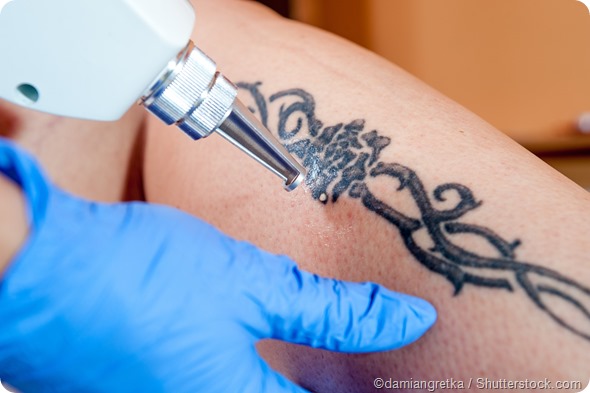It is important for individuals who have a tattoo that they wish to remove to consider both the benefits and risks of laser tattoo removal – this will allow them to make the best decision for their situation. This article outlines the primary risks and benefits of laser tattoo removal.

What is laser tattoo removal?
Laser tattoo removal is a procedure that utilizes high-powered lasers that penetrate deep into the skin and are able to permanently demolish the ink particles within the cells that give the color to the tattoo. There are different types of lasers that may be used to remove tattoos, depending on the color of ink of the tattoo.
The procedure for the tattoo removal will depend on the characteristics of the tattoo and the individual person. Most people will require a series of short sessions 1-2 months apart to remove the tattoo, although the exact number of sessions cannot be predicted in advance. Usually 5-10 sessions are required, although up to 20 may be required in some cases. The variability depends on many factors, such as the size, color, location and age of the tattoo.
With improved technology in recent years, the outcomes of laser tattoo removal have become more positive by increasing efficacy and reducing the risk of adverse effects.
Laser Tattoo Removal - How a Tattoo is Removed
Benefits of laser tattoo removal
Laser tattoo removal is a permanent procedure that will completely remove the tattoo from the skin.
There are many reasons that an individual may want to removal a tattoo from their body. These may include regret or dissatisfaction with the appearance of the tattoo on their body. Others may wish to remove a tattoo to improve employment prospects, due to the negative stigma of tattoos and their association with unprofessionalism in the workplace.
Risks of laser tattoo removal
Complete removal of a tattoo can sometimes be difficult, particularly for people who have dark colored skin or who want to remove a tattoo with color. Some people may also notice changes in the texture or color of their skin following laser treatment.
For the vast majority of individuals who undergo laser tattoo removal, a series of laser treatments is required to remove the tattoo completely. This increases the exposure to laser light, thus increasing the risk of associated complications. Additionally, the series of treatments can become very costly.
The procedure can also be uncomfortable and may cause the individual to experience pain in the area treated. To minimize this, an injection to provide local anesthesia may be provided prior to treatment.
Additionally, the laser light has the potential to harm the eyes and affect eyesight. It should be recommended for individuals to wear protective eye goggles for this reason.
Infection of the skin can sometimes occur due to laser tattoo removal, particularly when an area of the treatment is neglected. It is important for patients to protect the area of skin that has been treated – this will reduce the risk of bacterial entry and subsequent infection. Adequate aftercare following the treatment is essential for this reason.
Risk minimization
The aftercare following laser removal of a tattoo is essential to minimize the risk of complications. Keeping the skin clean by washing it in an appropriate manner regularly in the days following the procedure is recommended. Using a petrolatum ointment can also assist in the healing process of the skin. The area should remain covered with a sterile bandage for approximately one week after each session.
References
- https://www.sknclinics.co.uk/about-skn/news-and-blog/blogs/2014/apr/possible-risks-benefits-of-laser-tattoo-removal
- https://www.ucsfhealth.org/treatments/laser_tattoo_removal/
- https://www.ncbi.nlm.nih.gov/pmc/articles/PMC4411606/
- http://my.clevelandclinic.org/health/treatments_and_procedures/hic_Laser_Removal_of_Tattoos
Further Reading
Last Updated: Feb 26, 2019